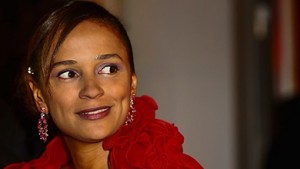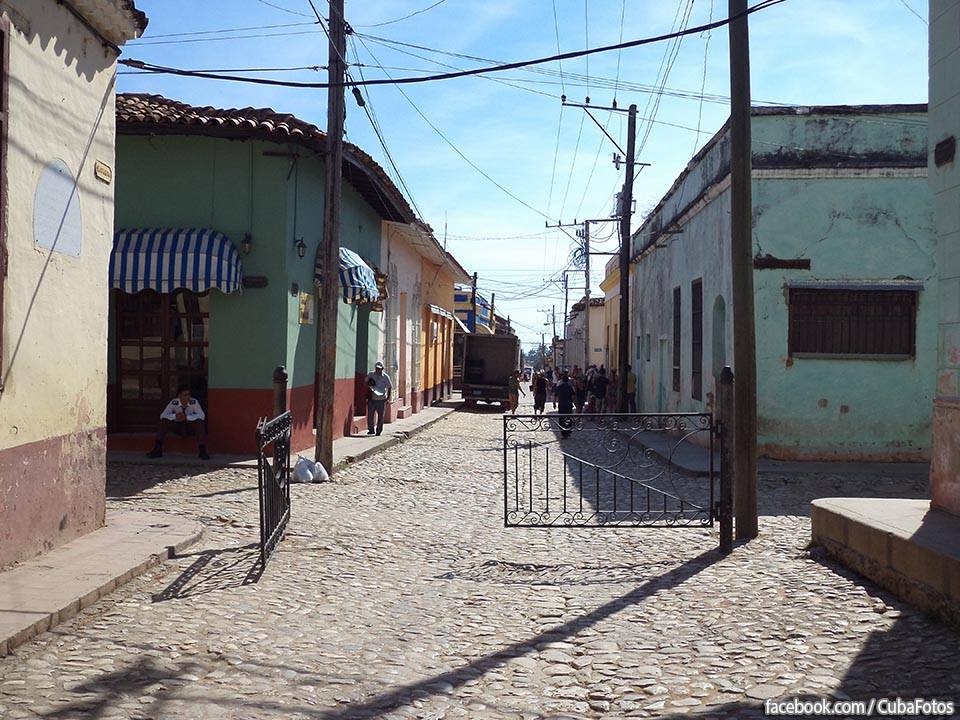¿QUE PASA HOY EN ANGOLA?
Lleva treinta y cinco años en el poder, es el padre de la mujer más rica de África y ha erigido en Angola uno de los regímenes más corruptos del mundo. Se llama José Eduardo dos Santos y está de visita en Cuba, desde donde se le ayudó a ganar una guerra que costó más de dos mil muertos cubanos.
Ayer en la tarde llegó a nuestro país el líder del Movimiento Popular para la Liberación de Angola (MPLA) y el gobierno lo recibió como un compañero de ruta. En su territorio se libró una larga y cruenta contienda bélica desde 1975, en la que participaron más de 377.000 militares cubanos y unos 50.000 cooperantes civiles nuestros. A pesar de tan prolongado e intenso contacto entre ambas naciones, en la Isla pocos están informados de la situación que vive hoy esa “tierra liberada”.
Dos Santos ha ejercido la presidencia de forma autoritaria y concentra en sus manos los poderes de presidente y primer ministro, además de controlar el parlamento, el sistema judicial y el principal partido político de la nación africana. En 2010 quedó aprobada una nueva Constitución que puso fin a la división de poderes y confirmó al presidente como comandante supremo de las Fuerzas Armadas y como la figura que determina la composición del Tribunal Supremo.
Angola se debate entre los mayores contrastes y las peores tragedias. La malversación de los fondos públicos y el desvío de los recursos del Estado son prácticas comunes que han permitido enriquecerse a muchos. Sus principales riquezas se han convertido en sus mayores fuentes de problemas. El petróleo, los diamantes y el uranio, sumados a sus reservas de oro, hierro y bauxita, han alimentado a toda una legión de corruptos que encuentran amparo bajo Dos Santos.
Las enfermedades diarreicas, la fiebre tifoidea, el paludismo, la tuberculosis y la llamada enfermedad del sueño campean por su respeto entre la población angoleña y colocan a la nación en una lista de países de “alto riesgo” para la salud. En la actualidad más de cuatro mil cubanos están realizando misiones en su territorio, en sectores como la educación, la construcción y la salud, pero eso representan apenas una gota en un océano de necesidades.
El VIH también se ceba en los angoleños. Las cifras oficiales confiesan sólo unos 200.000 casos de personas que padecen el virus, pero basta recorrer sus calles y aldeas para percatarse de la alta incidencia social de ese flagelo. El maltrato a la mujer, la esclavitud infantil y las constantes delitos sexuales tienen una alta incidencia. El tráfico de cocaína y la venta de seres humanos para usarlos en la servidumbre resultan lucrativos negocios.
Como si todo este cuadro no fuera suficiente, Angola muestra índices preocupantes en cuanto a violaciones de derechos humanos. Las limitaciones a la libertad de asociación y reunión son algunos de los derechos vulnerados, lo cual coincide con idéntica práctica llevada a cabo por el “gobierno amigo” de la Plaza de la Revolución.
Sin embargo, los alarmantes indicadores en cuanto a salud y represión, no hacen desistir a muchos cubanos de volver a emprender la ruta angoleña. Esta vez no van a pelear en una trinchera, sino a ocupar empleos en clinicas, empresas o escuelas. En el país africano reciben una remuneración económica superior a los bajos salarios de la Isla. Las llamadas “misiones” en Angola son mucho más apetecidas por los profesionales médicos que las realizadas en Venezuela. Se venden a los precios más altos en el “mercado de las influencias” dentro del Ministerio de Salud Pública.
Los medios nacionales angoleños –y los cubanos– no han reportado que la primogénita del presidente ya superó la barrera de los dos mil millones de dólares en fortuna personal. Isabel dos Santos controla más del 25% de las acciones de Unitel, una de las dos compañías telefónicas del país. También tiene participaciones en empresas de Portugal, donde se comenta que es la principal accionista de la mayor empresa de televisión por cable del país. La falta de transparencia rodea al poder en Luanda, y las personas cercanas al gobernante se han hecho con los puestos claves de la economía nacional.
Mientras su padre se pasea por La Habana, a Isabel Dos Santos se le ubica en Brasil, donde la revista Veja ha sacado varias fotos de la multimillonaria angolana durante la ceremonia inaugural del Mundial. Según la publicación, unas 600 personas –entre hombres de negocio y famosos– habrían sido “acomodadas” por la empresaria en habitaciones de lujo de Sao Paulo, Rio de Janeiro y Belo Horizonte, para disfrutar de los partidos de fútbol y de la euforia del Mundial.
Historias como esas jamás serán contadas por la prensa oficial cubana. Las familias que perdieron a sus hijos en aquel lejano territorio no saben en qué se ha convertido el país donde cayeron los suyos.
14YMedio/Yoani Sanchez, La Habana/ InternetPhotos/www.thecubanhistory.com
QUE PASA HOY EN ANGOLA ?
The Cuban History, Hollywood.
Arnoldo Varona, Editor.
¿WHAT HAPPEN TODAY IN ANGOLA?
Take thirty-five years in power, is the father of the richest woman in Africa and has emerged as one of Angola’s most corrupt regimes in the world. His name is Jose Eduardo dos Santos and is visiting Cuba, where he helped win a war that cost over two thousand Cubans killed.
Yesterday afternoon came to our country the leader of the Popular Movement for the Liberation of Angola (MPLA) and the government received him as a fellow traveler. In its territory a long and bloody military conflict since 1975, in which more than 377,000 Cuban military and 50,000 civilian aid our escaped. Despite such a long and intense contact between the two nations on the island few are aware of the situation that today that “liberated land.”
Dos Santos has held the presidency in an authoritarian and concentrated in his hands the powers of president and prime minister, besides controlling the parliament, the judiciary and the main political party of the African nation. In 2010 a new constitution was adopted that put an end to the division of powers and confirmed the president as supreme commander of the armed forces and as the figure that determines the composition of the Supreme Court.
Angola is currently dealing with higher contrasts and the worst tragedies. Misappropriation of public funds and diversion of state resources are common practices that have allowed many rich. Its main assets have become their major source of problems. Oil, diamonds and uranium, added to their gold reserves, iron and bauxite, have fueled a legion of corrupt they find shelter beneath Dos Santos.
Diarrheal diseases, typhoid, malaria, tuberculosis and sleeping sickness campean call for his respect among the Angolan population and put the nation on a list of countries of “high risk” to health. At present more than four thousand Cubans are doing missions on its territory, in sectors such as education, construction and health, but that represents only a drop in an ocean of needs.
HIV also preys on Angolans. Official figures confess only about 200,000 cases of people suffering from the virus, but just walk the streets and villages to realize the high social impact of this scourge. The mistreatment of women, child slavery and constant sexual offenses have a high incidence. Cocaine trafficking and the sale of human beings for use in servitude are lucrative.
As if all this were not enough box, Angola indices shows worrying about human rights violations. Restrictions on freedom of association and assembly are some of the violated rights, which coincides with the same practice carried out by the “friendly government” in Revolution Square.
However, the alarming indicators in health and repression do not deter many Cubans to take back the Angolan route. This time they will not fight in a trench, but in clinics to fill jobs, companies or schools. In the African country are higher than the low wages of the island calls “missions” financial remuneration in Angola are much relished by medical professionals than those in Venezuela. Sold to the highest prices in the “market influences” within the Ministry of Public Health.
Angolan national media, and the Cubans have not reported the eldest of President already surpassed the barrier of two billion dollars in personal wealth. Isabel dos Santos controls more than 25% of the shares in Unitel, one of the two phone companies in the country. It also has holdings in Portugal, where it is said that is the main shareholder of the largest cable television company in the country. The lack of transparency surrounding the power in Luanda, and people close to the president have seized key positions in the national economy.
While her father walks around Havana, Isabel Dos Santos is located in Brazil, where the magazine Veja has released several photos of the Angolan multimillionaire during the opening ceremony of the World. According to the publication, some 600 people, including businessmen and celebrities-have been “accommodated” by businesswoman in luxury rooms of Sao Paulo, Rio de Janeiro and Belo Horizonte, to enjoy football matches and euphoria World.
Stories like these will never be told by the official Cuban press. Families who lost their children in that distant territory not know what has become the country fell theirs.
14YMedio/Yoani Sanchez, Havana / InternetPhotos / www.thecubanhistory.com
¿WHAT HAPPEN TODAY IN ANGOLA?
The Cuban History, Hollywood.
Arnoldo Varona, Editor.



 > ¿WHAT HAPPEN TODAY IN ANGOLA? . (Photos) * * QUE PASA HOY EN ANGOLA ? (Fotos)
> ¿WHAT HAPPEN TODAY IN ANGOLA? . (Photos) * * QUE PASA HOY EN ANGOLA ? (Fotos)


